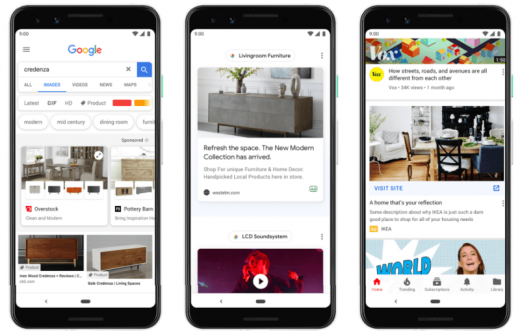Google announces new ‘discovery’ ad formats, revamped Shopping experience, native placements at Google Marketing Live
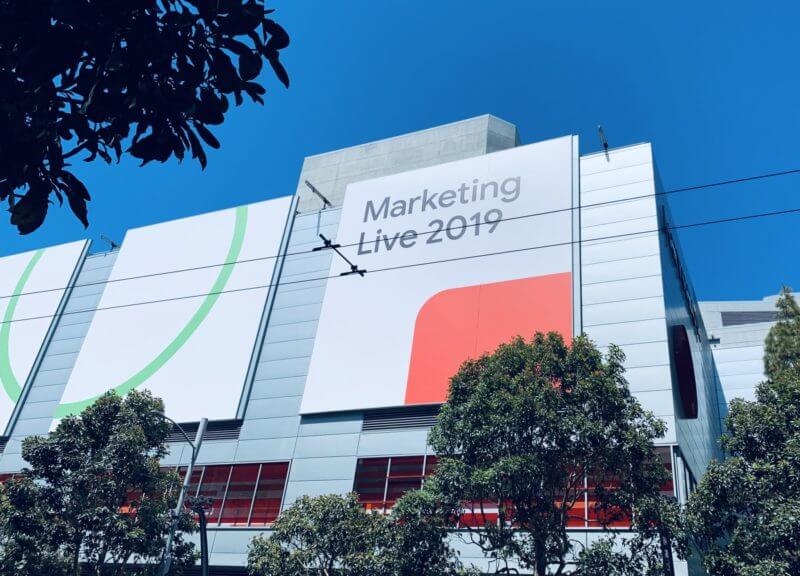
SAN FRANCISCO — Discovery is a big theme at this year’s Google Marketing Live, its annual event to unveil new ads products, held in San Francisco this year. And several new ad units announced today are designed to address top-of-funnel consumer scenarios. Discovery ads, Gallery ads and expanded reach for Showcase Shopping ads were all unveiled at GML.
These formats share the fact that they’re all highly visual, appear across multiple Google properties and are all automated, like Universal App Campaigns (now App Campaigns). Universal App Campaigns first launched in 2015 and have emerged as a model for all of Google’s newer automated formats.
Google also announced a redesigned and improved Google Shopping experience. Last week, we reported on updates to the Google Ads app and new inventory for Local campaigns.
Discovery ads
Discovery ads are native ads that appear in multiple Google feed environments. Google’s VP of Product Management Brad Bender said at a press briefing (May 18, 2019) that Discovery ads are “visually rich, mobile first and use the ‘power of intent.’” Here, “power of intent” means signals Google derives from consumers’ past site visitation, app downloads, videos watched and map searches. These are essentially the same signals Google uses for its In-Market audience targeting.
To get started, advertisers must specifically create a Discovery campaign and upload ad copy and creative assets. Google will then optimize the best performing combinations using machine learning. Discovery ads appear in the Google Discover feed (iOS, Android Google app and mobile Google.com) on the mobile YouTube feed and in Gmail (under the social and promotions tabs).
Google also revealed that the Discover feed now reaches 800 million users globally. The company added that Discovery ads will become available to advertisers later this year, worldwide. (Learn more about Discovery ads.)
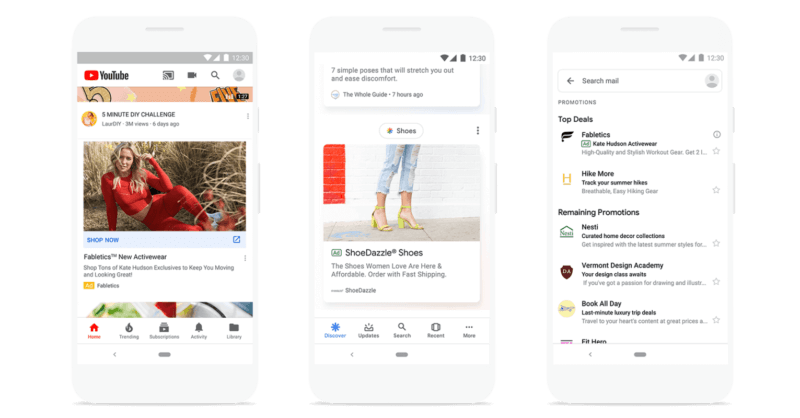
Gallery ads
Gallery ads are more visually compelling units that will appear at the top of mobile search results. They offer a scrollable gallery with between four and eight images and up to 70 characters available for each image. Advertisers pay for these on a CPC basis, either when a user clicks through to a landing page or swipes to the third image in the sequence. There may be no CTRs on some of these ads, just image swipes. However, the cost for a click or a swipe (“paid swipe”) is the same.
Google said in a blog post that, in testing, Gallery ads saw “25% more interactions” that other search ad units. These ads will compete with other search ad formats for placement at the top of results. However, to the extent these units generate more engagement they may enjoy higher quality scores accordingly.
They’re not available for the desktop but may become so in the future. There’s also no word on whether Gallery ads will ultimately include video. However, Google has tested movie trailer ads in search. (Learn more about Gallery ads.)
New inventory for Showcase Shopping ads
Showcase Shopping ads were first introduced for search in 2016 and are intended to offer retailers the opportunity “showcase” a curated list products responsive to non-branded searches such as “summer dresses” or “outdoor furniture.” Google previously said that up to 40% of queries are for these broad product-category searches.
The announcement today extends Showcase Shopping ads to Google Images, the Discover feed, and YouTube feed. The latter will roll out in the near future.
The ads feature a main image and smaller images, but expand to offer multiple products selected by the retailer. The ads can also carry location information for those retailers that have nearby locations and offer the featured product(s) in-store. See more Shopping news below.
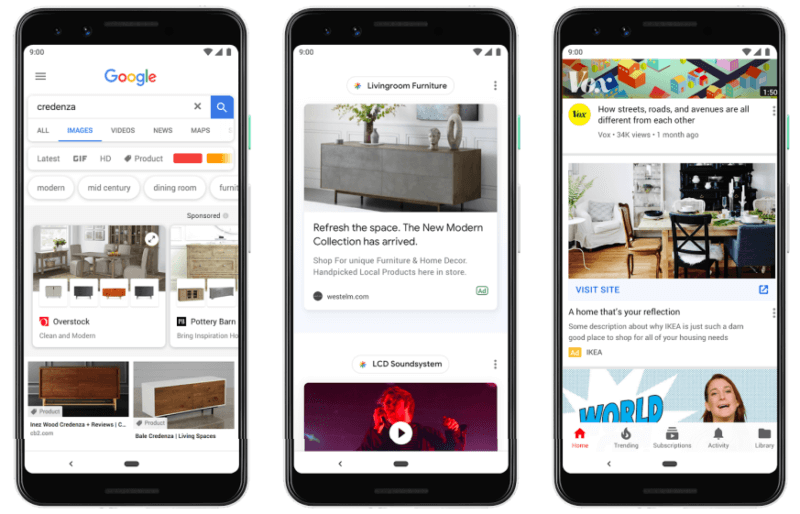
App deep linking and reporting for Google Ads
Google is also implementing app deep linking from Google Ads, together with improved reporting. If a user has the marketer’s app installed they’ll be taken into that app from Search, Shopping or Display campaigns. That enables a personalized and expedited shopping and checkout process. That compares with the friction that could be involved with an anonymous mobile web experience requiring a customer log in or entering payment credentials again.
In its blog post, Google said that in early testing, “on average, deep linked ad experiences drove 2X the conversion rates.” Google will also offer better reporting on these ad-to-app conversions if marketers have integrated with Google Analytics for Firebase.
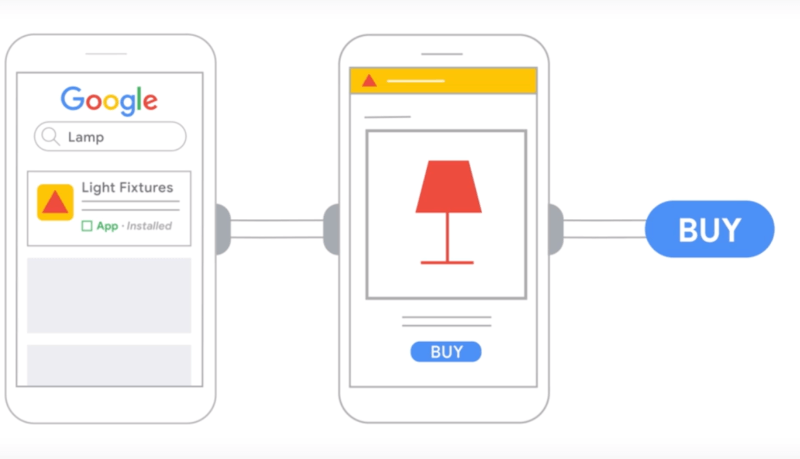
Google Shopping redesign incorporates Google Express
Another significant announcement is the launch of a redesigned Google Shopping destination that seeks to standardize and improve the experience for consumers. The new Google Shopping first launched in France in March. That experience will now be more personalized. Consumers will be able to buy on merchant sites, in a local store or directly on Google, where Google will manage the transaction.
The company says that the new experience represents the merger of “the best of Google Express with Google Shopping.” Google is seeking to standardize the consumer experience and instill confidence with simplified returns and better customer service.
Merchants that are already part of Shopping Actions will be opted-in to “this new easy purchase experience on Google Shopping,” which is available on Google.com and through the Google Assistant as well. Google said that Shopping Actions will also be extended to YouTube and Google Images later this year.
These improvements are part of an effort to more effectively compete with Amazon and minimize some of the competitive advantages the Seattle company had over the previously inconsistent and more fragmented shopping experiences on Google. (Learn more about the new Google Shopping.)
This story first appeared on Search Engine Land. For more on search marketing and SEO, click here.
Marketing Land – Internet Marketing News, Strategies & Tips
(55)

